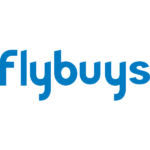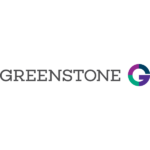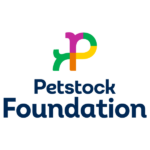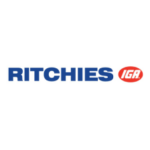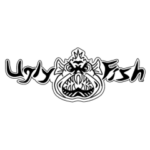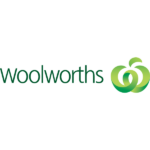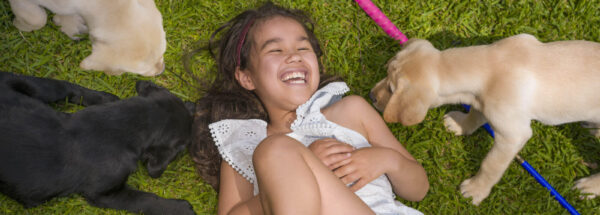Welcome
A message from the CEO.
Welcome to the Winter Issue of Guide Dog Tales!
On behalf of Jacqui Jones (Chair) and myself, we wanted to thank you for your generosity to Guide Dogs NSW/ACT this past year. Thanks to you we have achieved some amazing milestones! This would not have been possible without you.
Some of our achievements include but aren’t limited to, increasing our Client numbers, having the highest number of working dogs in the community, and growing dog success rates significantly.
Thanks to your support, we also had one of our best-performing Tax appeals. We are extremely grateful for your support, especially in light of economic challenges faced by all Australians. This is a testament to the generosity of you, our supporters.
We are excited to continue to innovate and make a positive impact on our Clients and communities. We are confident that with your continued dedication and collaboration, we will reach our vision of a world that is inclusive and accessible for everyone with low vision or blindness.
As you read through this edition of Guide Dog Tales, I hope you are inspired by the achievements of our Clients and our dogs, as well as the positive impact you are having on their lives. Thank you again for your ongoing support.
Warmly,
Dale Cleaver and Jacqui Jones
Chief Executive Officer and Chair
Cover star
Lucy
Our latest cover star is Guide Dog Lucy. Supported by a donor who left a gift in their Will, Lucy has finished her Guide Dog training.
With your support, there is no limit to the independence and freedom that Lucy can bring to a person with low vision or blindness.
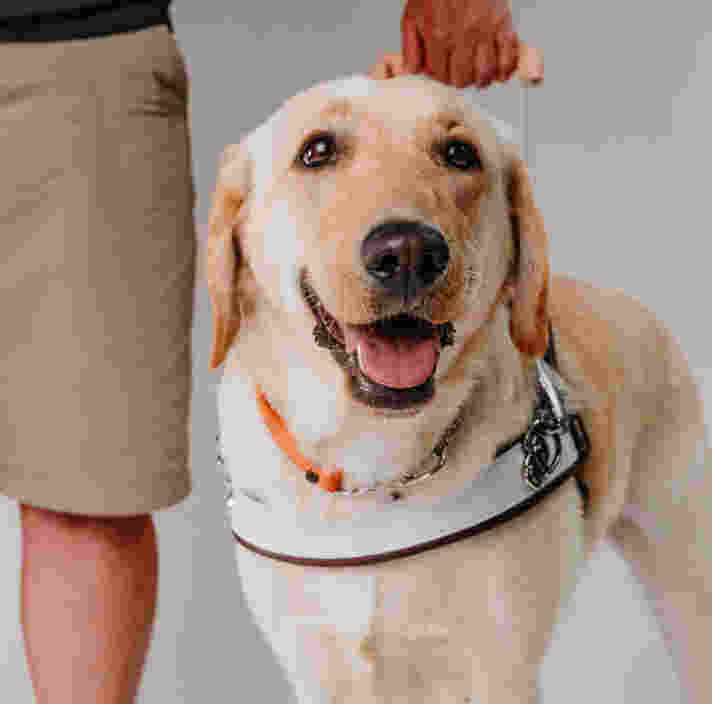
Meet the team
My name is Shan and I have been involved with Guide Dogs NSW/ACT for 46 years now. I have worn many hats during my time at Guide Dogs, from Assistant to the CEO to Client Services Administrator and now Receptionist.
During this time, I’ve witnessed many exciting changes. I joined Guide Dogs NSW/ACT when we were located at Milsons Point, with only eight staff members in an office overlooking Luna Park. We were known as ‘Royal Guide Dogs Australia’ at that time. I was Executive Assistant to the then CEO Jim Jones who asked me to assist the two Mobility Specialists.
At that time, appointments with Clients were listed on a whiteboard. We then progressed from a manual typewriter (only to be seen in museums now!), to an electric one and then backing up floppy discs in the early computer days, which I had to back up every Friday night.
I’ve seen firsthand the change in variety and scale of support Guide Dogs offers people with low vision or blindness. Guide Dogs NSW/ACT has grown from a small team operating out of Sydney into multiple teams working across regional NSW and the ACT, providing all manner of services, including Orientation and Mobility (O&M), Occupational Therapy (OT), Assistive Technology (AT) and more.

The culture, the rationale and the strategy of how we operate has always been what I admire and witnessed in my years of talking to Clients.
The recent showcase of our updated Strategy 2030 focusing on accessibility, low vision, and embracing the future of digital and technological advances is more than exciting.
Beyond our services, Guide Dogs has grown to become a source of empowerment for our Clients, as well as an advocate for improved accessibility and inclusion for people with low vision or blindness. It’s just another reason I feel proud and privileged to be part of Guide Dogs.
I hope you enjoy this Winter edition of Guide Dog Tales. In this newsletter you’ll find heartwarming stories of our Clients and how your support continues to make a meaningful impact. Thank you for your continued support.
Pet Tips
Enrichment activities for your furry friends
Dogs bring immense joy and companionship into our lives so it’s important to keep them happy and engaged. When dogs are sedentary they can easily become bored, which may lead to unwanted behaviours.
To prevent this, having a range of toys and activities on hand is one way to positively direct their energy.
Here are some fun and engaging activities to consider:
- Nose work: hide your dog’s favourite treats around the house or yard and let them use their sense of smell to find them. Snuffle mats are an excellent tool for this activity.
- Digging and discovering: place a children’s clamshell filled with sand in your backyard. Your dog can enjoy digging in the sand or you can hide treats and toys for them to discover. In summer, these shells can double as a refreshing doggie pool.
- Hide and seek: engage in a playful game of hide and seek with your dog. It’s a fun way for them to not only use their senses, but to stay active.
- Durable toys: there are numerous toys available that can keep your dog entertained for hours. Brands like Kong offer durable toys that can stand the test of time and provide endless fun.
By incorporating enrichment activities like these into your dog’s routine, you can contribute to their overall wellbeing and happiness.
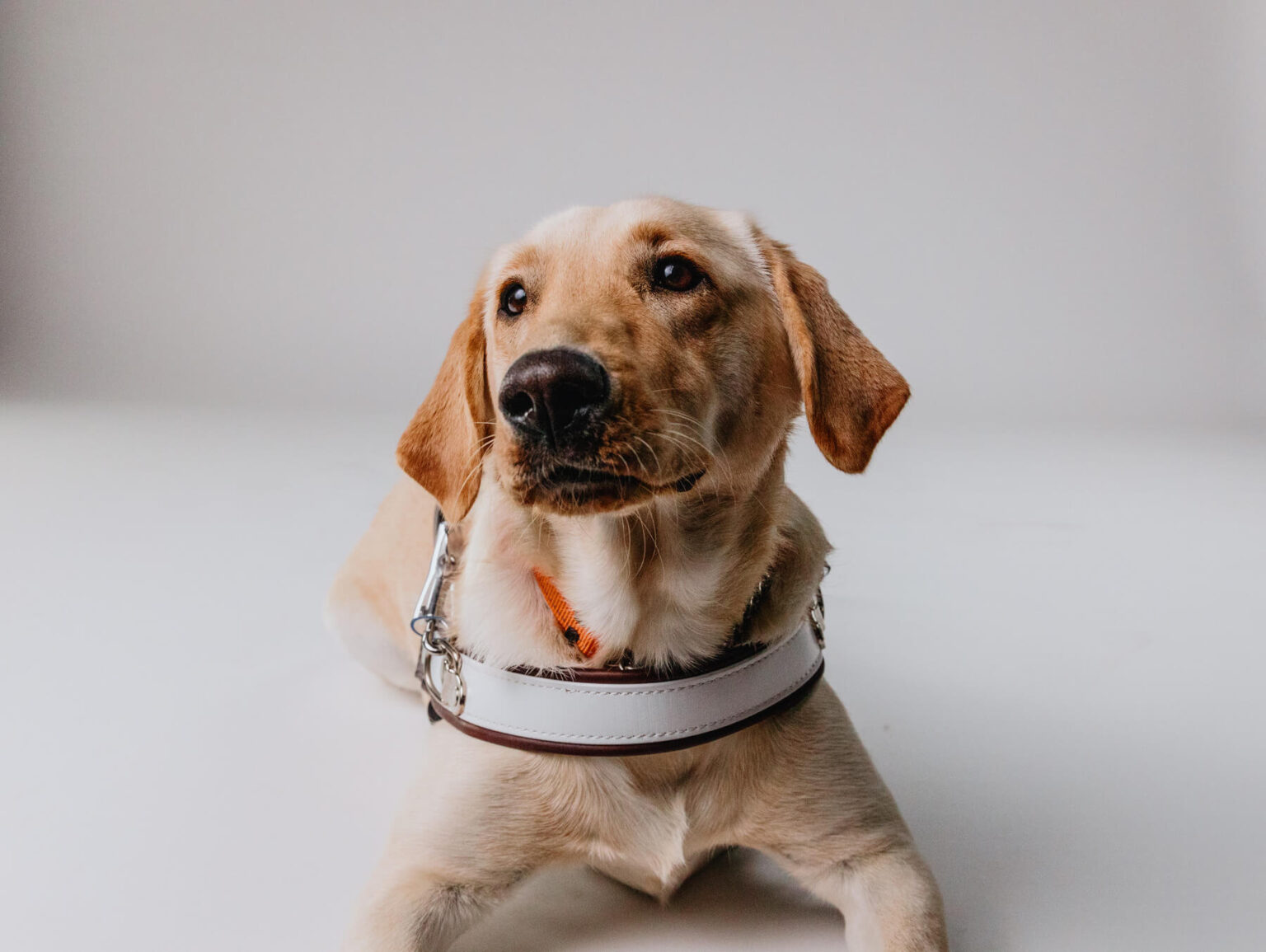
Dogs off Duty
Lucy and Dottie
“If there is one thing you must know about my Guide Dog, Dottie, it’s that she loves soft toys. In fact, when she isn’t working, you’ll hardly see her without a soft toy in her mouth or tucked between her paws. After arriving home from a day at work the first thing Dottie does is run to her toy box and pick out a soft toy, usually she picks her pink elephant which is the first toy I bought her when she came home with me two years ago. Sometimes, she will nap in her beanbag, cuddled up with her toy, and other times when she needs to expel some excess energy she will parade around my apartment and make sure I can hear she’s found the toy’s squeaker. Sometimes, I even wonder if she’d pick her soft toys over food!” says Lucy.
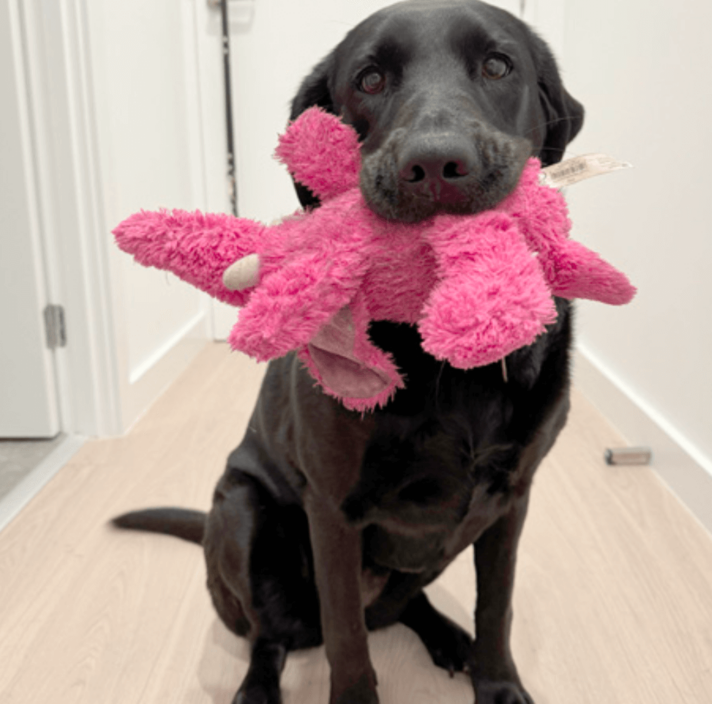
Wherever you can go, Guide Dogs can go too.
It was International Guide Dog Day on Wednesday 24 April, a day that celebrates the important role Guide Dogs play in supporting people around the world with low vision or blindness.
This year the theme was ‘Wherever you can go, Guide Dogs can go too.’ Even though it’s the law to let Guide Dogs travel, society often gets in their way. In fact, almost every second journey for Guide Dog Handlers results in a refusal from a taxi or rideshare. If they can’t get a ride, they can’t get to where they need to go.

The important message highlighted this year was that it’s time we paid more attention to the access rights of people with low vision or blindness to allow them and their Guide Dogs to move independently around their communities.
Our team at Guide Dogs NSW/ACT marked International Guide Dog Day with a café pop-up event at our St Leonards Office. We welcomed members of the public to join us, meet our team, and interact with our Guide Dogs, Therapy Dogs and even pups-in-training, all while enjoying some sweet treats and engaging activities.
Thank you to everyone who attended and supported our ongoing advocacy to enhance the recognition of access rights for Handlers and their Guide Dogs!

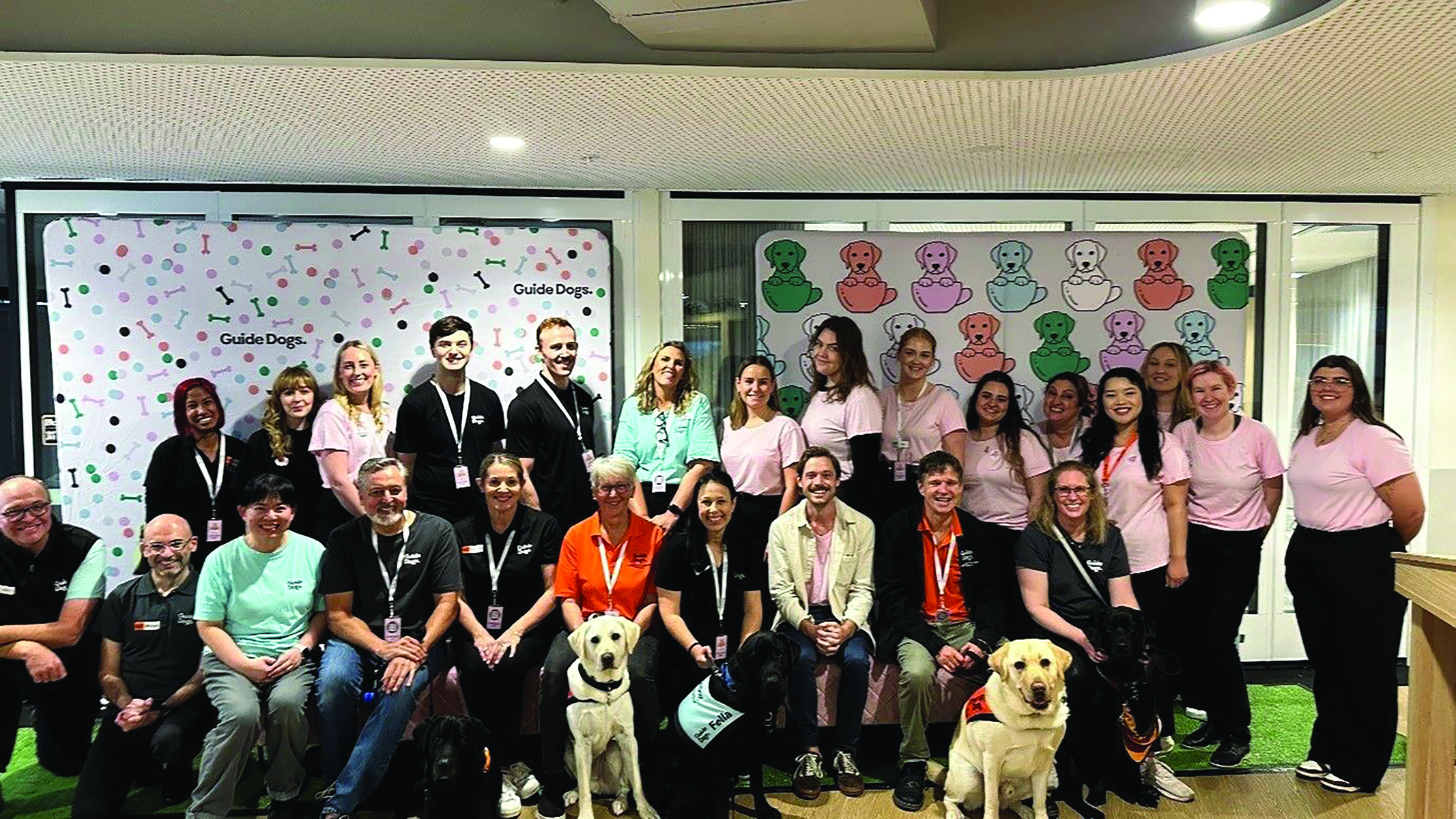
Legacy
Kelly is already a gift, but will she become a Guide Dog?
As the flagship puppy of our gifts in Wills litter, we have high hopes for this special little girl. Kelly’s training was made possible by a generous bequest from the late Mr Adrianus Van de Bunt. Mr Van de Bunt was a steadfast supporter of Guide Dogs, and when he wrote his Will, he chose to leave a lasting legacy by donating a portion of his estate to the charity that he believed in. Kelly (a family name) is the puppy that was named in his honour.
Now eight-months-old, Kelly is loving life with her Puppy Raisers, Darren and Kate. Kelly is the ninth puppy this down-to-earth couple have raised, so her paws are in very experienced and devoted hands!
Kelly’s current home is a five-acre puppy paradise complete with three whippets, three miniature donkeys, and plenty of wild rabbits! Darren and Kate work in the city, so their unique circumstances give Kelly the advantage of growing up to be very comfortable in both country and city environments.
When Kelly is at work, she is quite the celebrity. Everyone knows her. ANZ Bank, where Darren and Kate work, has been very supportive of them bringing a Guide Dog in training into the office.
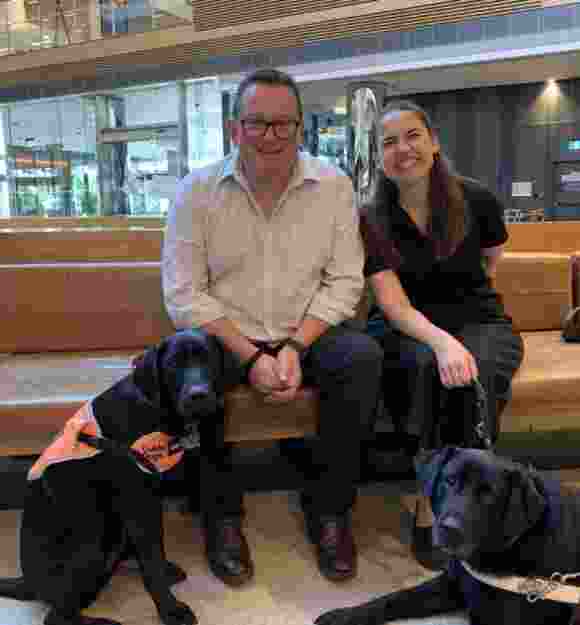
Many years ago, Darren became great friends with one of his co-workers, Erin, a Guide Dog Handler. Ever since, Darren has had a real passion for Guide Dogs. Darren and Kate believe that Guide Dogs give people independence, freedom, and choice.
Darren says, “These dogs are a product of love. It doesn’t matter if Kelly grows up to be a Breeding Dog, Therapy Dog or a Guide Dog. She will change someone’s life forever. She has already made such a difference in ours.”
“When I found out Kelly was a Legacy Dog, we did initially feel some pressure. Knowing that someone has made such a special investment in her inspires me to do the best I can to get her across the line. A gift in your Will is a gift that extends. When we do something so selfless, that is when we are the best version of ourselves. One of these dogs can end up helping someone with mobility, PTSD, and so much more. When you leave a gift in your Will, it’s like a time capsule of happiness.”
Darren continues, “Kelly is great in the office, great at stairs and elevators. She is great at heights. She loves the revolving doors in my office building and will drag me towards them when she sees them. She is great at train stations, great in the car and great at toileting. She rarely complains and is eager to please.”
Stay tuned for more updates on Kelly and the gifts in Wills litter! Find out how you can change the life of someone with blindness or low vision by leaving a Gift in your Will.
Eye health
Spotlight on Stargardt disease
Let’s shine a spotlight on Stargardt disease, a rare but impactful inherited eye condition affecting central vision and potentially leading to blindness.
What is Stargardt disease?
Stargardt disease, also known as juvenile macular degeneration, is a genetic disorder affecting the retina’s central region, the macula. This area is crucial for sharp vision needed for activities like reading and recognising faces. The disease leads to progressive central vision loss.
Who gets Stargardt disease and how common is it?
Stargardt disease is relatively rare, affecting about 1 in 8,000 to 10,000 people worldwide. It is usually inherited in an autosomal recessive pattern, requiring both parents to carry the gene mutation. In some cases, it occurs due to spontaneous genetic mutations.
What causes Stargardt disease?
Stargardt disease is caused by mutations to the ABCA4 gene. This gene is responsible for producing a protein that helps remove toxic byproducts from the retina. When this process is impaired, these byproducts accumulate, damaging the retina.
How do I know if I have Stargardt disease?
Symptoms typically start before age 20 and include progressive central vision loss, blurry or distorted vision, difficulty adapting to lighting changes, and dark spots in central vision. Diagnosis requires an eye examination revealing yellowish-white flecks in the retina and may be confirmed with specialised imaging and genetic testing.
Is there treatment for Stargardt disease?
There is currently no cure, but research is ongoing into treatments like gene therapy, stem cell therapy, and drugs to slow progression. Low vision rehabilitation services can help manage the condition by maximising remaining vision and improving quality of life.
The next generation of Guide Dog puppies, thanks to our Guide Dog Partner Program
One of Guide Dogs NSW/ACT’s most popular funding programs is the Guide Dog Partner Program. It enables a sponsor to name a puppy of their choosing and follow along their two-year journey into becoming a Guide Dog. The sponsor receives regular updates on development and training and has the opportunity to meet the dog.
Gene is one of our sponsored dogs in the Guide Dog Partner Program, named after one of our special supporters, Eugene and his wife Inge.
Recently, Gene went into assessment at the Guide Dogs Centre where the team examined her physical health and temperament. It was determined that Gene had the ideal characteristics to become a Breeding Dog. It is a great honour to be selected for this program, as only our top dogs are chosen to breed the next generation of Guide Dogs.
Sponsors Eugene and Inge were delighted to hear that Gene was pregnant with the next generation of puppies. Recently, they were invited to watch her ultrasound at one of our volunteer Home Whelpers. Did you know Guide Dogs NSW/ACT is the only state in Australia that offers a Home Whelping Program? This reduces stress on the mother and allows the pups to encounter humans in a family environment as soon as possible.
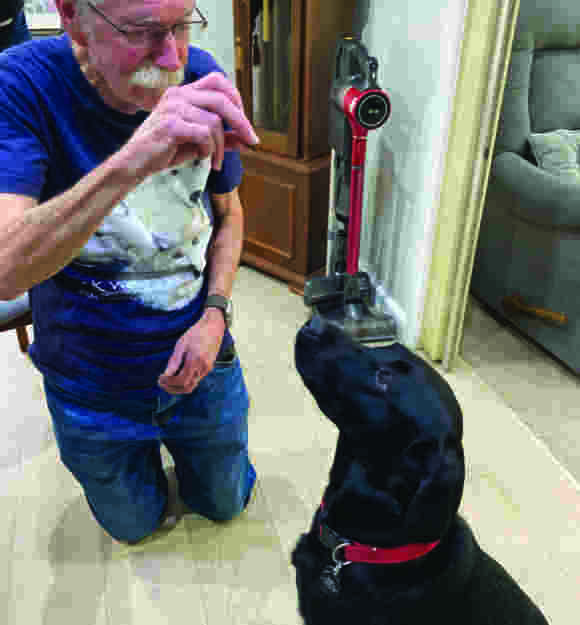
During the visit, our Whelp and Brood Advisor Chloe used a portable ultrasound machine on Gene to check on her puppies. This machine was generously funded by one of our Vet Partners. This portable ultrasound machine makes it easier for our Whelping Team to do home visits and check on the health of our dogs.
Eugene and Inge were amazed at how much Gene had grown and were also so excited to see the ultrasound and the puppies.
We are delighted to announce that Gene gave birth to eight beautiful, healthy pups in early June!
Gene’s sponsors are looking forward to seeing ‘mama’ Gene and meeting the next generation of Guide Dog puppies in person once they have been vaccinated!
We’re all wishing Gene the best of luck and looking forward to meeting the new ‘S’ litter of Guide Dog puppies. Learn more about the Guide Dog Partner Program.
Client spotlight
Bringing Blind Tennis to the Olympics
With the 2024 Olympics and Paralympics just around the corner, Guide Dogs Client Rob has started a strong campaign to get the sport recognised at the world’s most prestigious sporting event.
“We’re that close, we can smell it” he says.
“The requirement is having a certain amount of countries around the world having Blind Tennis as a sport, we’re only about one or two countries off reaching that.”
“The game is really growing and it’s a great time to be part of it,” he said.
“It’s pretty close to becoming a parasport. Even if we’re not in the Paralympics, we’re becoming an established sport very quickly. My goal is to see the sport become acknowledged on a global scale.”
Rob says in 2022 the game had only 30 state level players. Last year that number jumped to 70 competitive players with low vision or blindness in the national competition.
Many more people with blindness or low vision are just picking up rackets to play for fun.
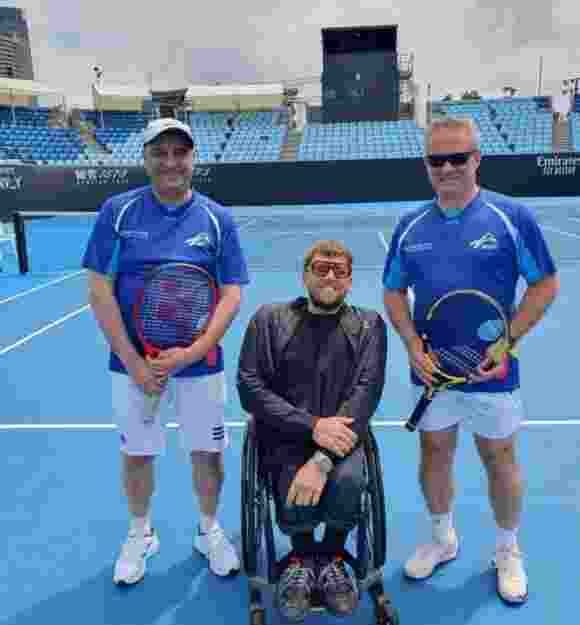
Blind Tennis is split into classifications according to the player’s vision and uses a modified ball that jingles. In the B1 category, players have no functional vision and wear a blindfold. They compete on a smaller court surrounded by tactile lines, with a lower net.
In the B2 category and upwards, players have increasingly better eyesight and the court is bigger and has no tactile lines. In B1 and B2, the ball is permitted to bounce three times before each shot, while in B3 two bounces are allowed and in B4, have a greater amount of sight so it may bounce only once. Rob plays in the B2 category, having only 4% peripheral vision.
“I can’t see the net if it’s one metre in front of me,” he says.
Rob lost his sight 13 years ago from Leber’s Congenital Amaurosis.
His Guide Dog Hamish is his companion and eyes, on and off the court.
“He is just such a good dog,” Rob said.
“He sits on the side next to the umpire’s chair and apparently his head goes back and forth watching.”
Hamish has also become quite the frequent flyer, accompanying Rob across the country for tennis tournaments.
Rob hopes the Australian Open will soon host the Blind Tennis national tournament to encourage larger crowds and showcase the sport as its popularity grows.
Volunteering and making a difference
We always welcome kind offers of help from supporters.
The Guide Dogs team have been fortunate over the years to have a loyal band of volunteer supporters who come into the office, work from home or join us at events. Their work is invaluable for Guide Dogs and contributes to our ongoing commitment to save costs where we can, so donor funds can be directed to where they are most needed, to our Clients and dogs.
One such supporter is Sylvie, who like so many of our loyal supporters, has been quietly supporting Guide Dogs in the background, over a number of years. In June 2022 Sylvie attended a Gifts in Wills morning tea where she heard first-hand from Client Services and Lived Experience speakers about the work Guide Dogs does to change the lives of people with low vision or blindness. Inspired by their stories and experiences, Sylvie offered her services as a volunteer.

Her help was welcomed with open arms and over the past two years, Sylvie has become an established and invaluable member of the team, attending the office on Wednesdays. Wednesday is a great day to be in the office, as there are not only working Guide Dogs and Ambassador Dogs around, but also the latest puppies coming in for their training class! “Being part of an amazing team and having an ‘inside view’ into the people and the way Guide Dogs works has brought a new depth of understanding and connection for me,” Sylvie said.
Recently Sylvie furthered her commitment to Guide Dogs by making the important decision with her husband Marcel to include a joint Gift in their Will. Their legacy will go on to help people with low vision or blindness live a full and inclusive life of their choosing.
If you would like more information about including a Gift in your Will or would like to let us know about an individual or joint Will arrangement, please contact Ali Kershaw on 0400 148 038 or email akershaw@guidedogs.com.au.
Please visit our webpage for more information on volunteering and a huge thank you to all our invaluable volunteers, both present and past!

Puppy Tales
Pip is learning new things every day with her Puppy Raiser
Pip is well on her way to becoming a Guide Dog and has been learning how to navigate the big wide world. She has been going everywhere with her Puppy Raiser and learning all of her basic skills.
Can you identify the mode of transport that Pip has been on in this dot-to-dot activity?
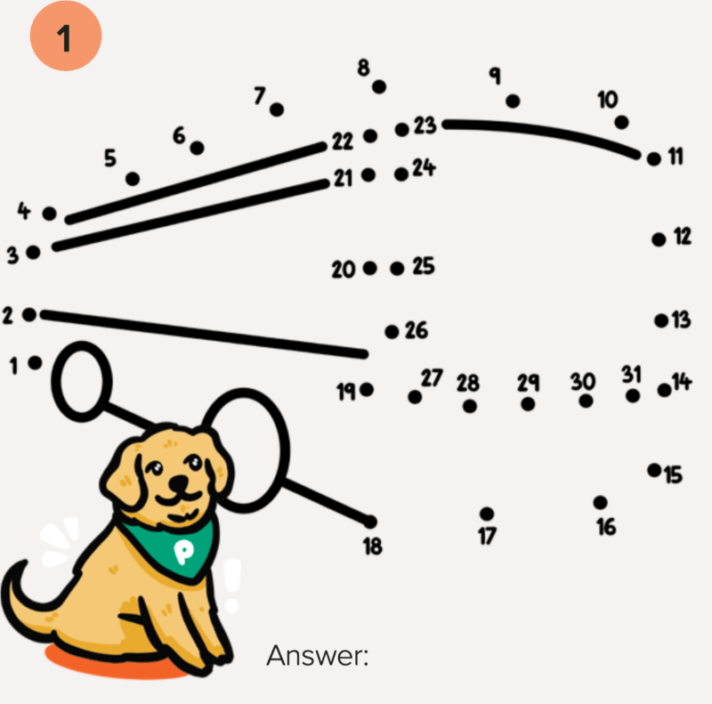
A decade of supporting people and animals
This year we celebrate ten wonderful years of partnership with the Petstock Foundation, who are committed to empowering a better future for pets and people.
Over that time Guide Dogs has received over $1 million from the Petstock Foundation so that we can enact that positive change and realise our mutual goal of empowering people through their connection with animals, in our case, our world-class dogs.
Partners such as the Petstock Foundation do so much more than provide funding. During their time as a valued Guide Dogs partner, the team at Petstock have:
- Encouraged suppliers and customers to participate in raising awareness and support through instore and online campaigns.
- Pounded the pavement for PAWGUST.
- Hosted Puppy Raising drives in-store, helping us to recruit our essential volunteer Puppy Raisers, on whom our dog socialisation and Puppy Raising Program so heavily depends.
- Supported our Puppy Raising Program by following the journeys of 16 pups including naming them and receiving in-store visits.
Our thanks to the team at the Petstock Foundation and Petstock team members for sharing our vision for empowered futures through our Dog Progam.
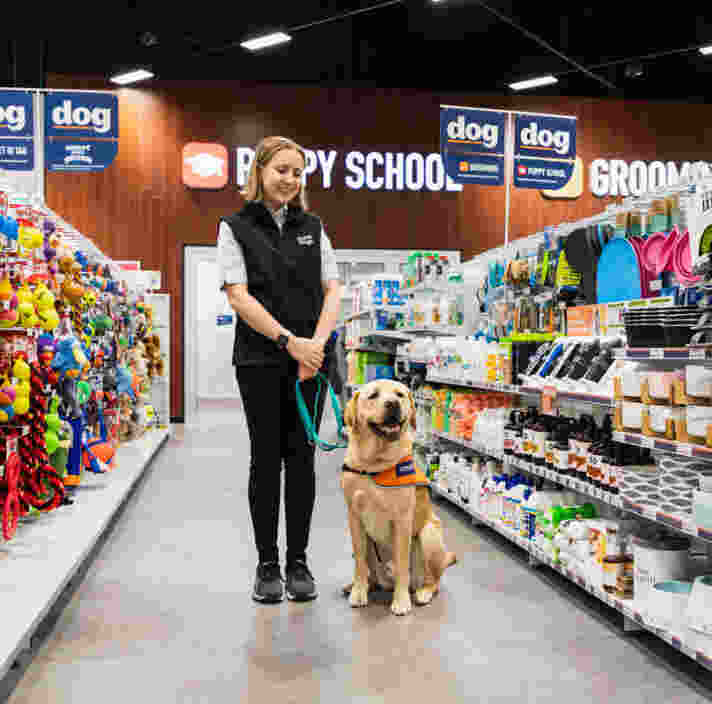
A valued legacy
Lady Coles became interested in bringing Guide Dogs to Australia in the 1930’s. Once Guide Dogs was established here in the 1950’s she became one of our most enthusiastic supporters, making and selling jam to fundraise, painting walls in the Guide Dogs Victoria Centre and encouraging everyone she knew to join her in supporting people with low vision or blindness. Coles has continued this fine tradition by hosting our Donation Dogs in-store for over 40 years.
This year Coles added to the $14 million already donated to Guide Dogs by their customers by unleashing a fundraising campaign in-store and online. Beginning on International Guide Dog Day and running for four weeks, Coles donated five cents from every purchase of dog food and treats sold to Guide Dogs.
The donations will help ensure that future generations of Australians living with low vision or blindness receive the essential support they need to achieve their goals and live the lives they choose.
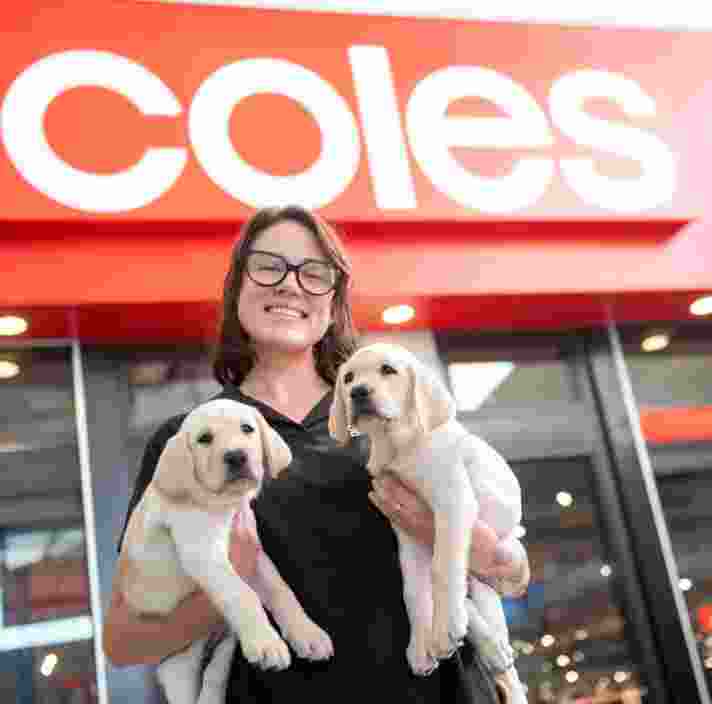
Our Partners
Thank you to our partners:
Your donations to Guide Dogs NSW/ACT help us to continue our important work, including matching Guide Dogs and Therapy Dogs, Orientation and Mobility services, providing regional outreach, undertaking diagnostic services through our Centre for Eye Health, and delivering technology support sessions and Occupational Therapy to more than 3,500 Clients.
Ready to continue?
Seems like you have filled this form earlier. Let’s pick up where you left off.



